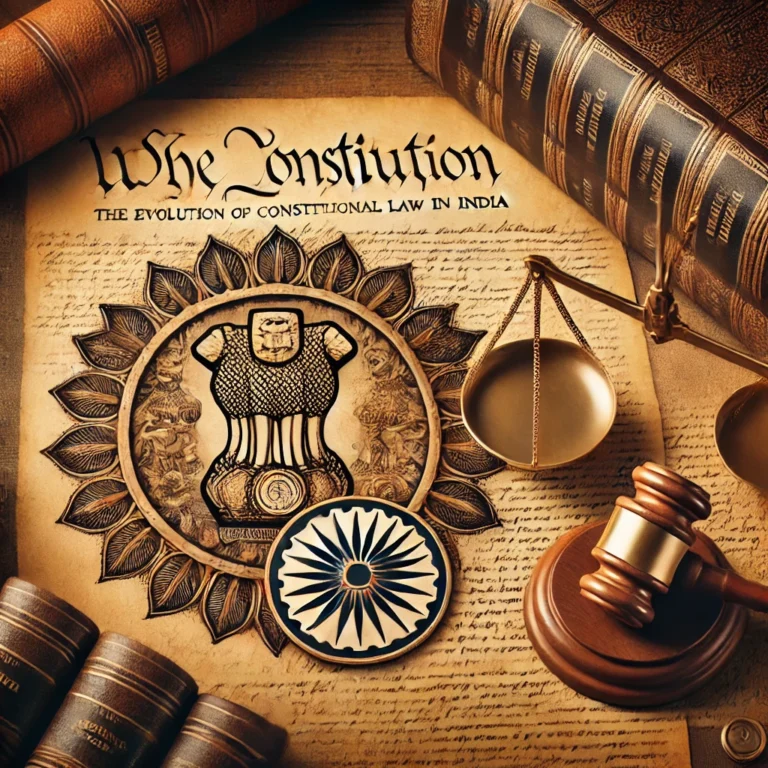An Overview of Key Laws in India
An Overview of Key Laws in India
India, with its rich history and diverse culture, boasts a complex legal system that reflects its multifaceted society. The legal system in India is based on a combination of statutory law, customary law, and judicial decisions. Indian law is deeply influenced by its colonial past, particularly British law, and has evolved significantly since India gained independence in 1947. This blog post provides an overview of some of the key laws in India that shape the country’s legal landscape.
1. The Indian Constitution
The Indian Constitution is the supreme law of the land, laying down the framework that defines the political principles, structures, procedures, powers, and duties of government institutions. It also guarantees fundamental rights to the citizens of India. The Constitution was adopted on January 26, 1950, marking the country’s transition to a sovereign republic.
Key Features of the Indian Constitution:
- Fundamental Rights: The Constitution guarantees six fundamental rights to all citizens: the Right to Equality, Right to Freedom, Right against Exploitation, Right to Freedom of Religion, Cultural and Educational Rights, and the Right to Constitutional Remedies.
- Directive Principles of State Policy: These are guidelines for the framing of laws by the government. They are not enforceable by any court, but they are considered fundamental in the governance of the country.
- Federal Structure: India follows a federal system with a clear division of powers between the central government and state governments.
- Judicial Independence: The judiciary is independent of the executive and the legislature, ensuring checks and balances within the government.
2. The Indian Penal Code (IPC), 1860
The Indian Penal Code (IPC) is the main criminal code of India, covering all substantive aspects of criminal law. Enacted in 1860, the IPC defines various offenses and prescribes penalties for them. It applies to all Indian citizens, except in the state of Jammu and Kashmir, which has its own penal code.
Key Provisions:
- Offenses Against the State: This includes waging or attempting to wage war against the government (Section 121), sedition (Section 124A), and others.
- Offenses Against Public Tranquility: These include unlawful assembly (Section 141), rioting (Section 146), and affray (Section 159).
- Offenses Against the Human Body: These include murder (Section 302), culpable homicide not amounting to murder (Section 304), and hurt (Section 319).
- Offenses Against Property: These include theft (Section 378), extortion (Section 383), robbery (Section 390), and dacoity (Section 391).
3. The Code of Criminal Procedure (CrPC), 1973
The Code of Criminal Procedure (CrPC) is the procedural law for conducting a criminal trial in India. It outlines the process for the investigation, inquiry, and trial of offenses and provides the machinery for enforcing criminal law.
Key Provisions:
- Investigation of Crimes: The police have the authority to investigate any cognizable offense, and they are required to follow specific procedures while doing so.
- Arrest of Suspects: The CrPC lays down the procedures for the arrest of suspects, including the rights of the arrested person.
- Trial Procedures: The code outlines the different stages of a criminal trial, from the framing of charges to the pronouncement of the judgment.
- Appeals and Revisions: It also provides the process for appealing against the judgment of a lower court and seeking revision of orders.
4. The Civil Procedure Code (CPC), 1908
The Civil Procedure Code (CPC) is the primary legislation governing the procedure for the administration of civil litigation in India. It provides the guidelines for the conduct of civil suits, including the procedures for filing suits, serving notices, and executing judgments.
Key Provisions:
- Institution of Suits: The CPC outlines the steps for the institution of civil suits, including the presentation of the plaint, service of summons, and filing of written statements.
- Trial Procedures: The code prescribes the procedures for the examination of witnesses, presentation of evidence, and arguments by the parties.
- Judgment and Decree: It provides the framework for the pronouncement of judgments and the execution of decrees.
- Appeals: The CPC also outlines the procedures for filing appeals against the decisions of lower courts.
5. The Indian Contract Act, 1872
The Indian Contract Act, 1872, is the law that governs contracts in India. It defines what constitutes a valid contract, the rights and duties of parties to a contract, and the remedies available in case of a breach of contract.
Key Provisions:
- Essentials of a Valid Contract: These include offer and acceptance, intention to create legal relations, lawful consideration, capacity to contract, and free consent.
- Performance of Contracts: The act outlines the obligations of the parties to a contract and the conditions under which contracts are discharged.
- Breach of Contract: It provides remedies for breach of contract, including damages, specific performance, and injunctions.
- Quasi-Contracts: The act also covers situations where an obligation is created without a contract, under the doctrine of quasi-contracts.
6. The Companies Act, 2013
The Companies Act, 2013, is the primary legislation governing the incorporation, regulation, and winding up of companies in India. It replaced the Companies Act, 1956, with significant changes aimed at improving corporate governance and ensuring greater transparency in the corporate sector.
Key Provisions:
- Incorporation of Companies: The act outlines the procedures for the incorporation of companies, including the requirements for the memorandum of association and articles of association.
- Corporate Governance: It introduces provisions for the appointment of independent directors, the establishment of audit committees, and the conduct of board meetings.
- Accounts and Audit: The act mandates the preparation and audit of financial statements, the appointment of auditors, and the filing of annual returns.
- Corporate Social Responsibility (CSR): It introduces the concept of CSR, requiring certain companies to spend a percentage of their profits on social welfare activities.
7. The Consumer Protection Act, 2019
The Consumer Protection Act, 2019, is the law that protects the rights of consumers in India. It aims to provide timely and effective administration and settlement of consumer disputes.
Key Provisions:
- Consumer Rights: The act recognizes six consumer rights: the right to safety, the right to be informed, the right to choose, the right to be heard, the right to seek redressal, and the right to consumer education.
- Consumer Disputes Redressal Commissions: The act establishes Consumer Disputes Redressal Commissions at the district, state, and national levels to hear and decide consumer disputes.
- E-commerce: The act includes provisions to regulate e-commerce, ensuring that online platforms comply with consumer protection laws.
- Product Liability: It introduces the concept of product liability, making manufacturers, sellers, and service providers responsible for the harm caused by defective products or services.
8. The Right to Information Act (RTI), 2005
The Right to Information Act, 2005, is a landmark legislation that empowers citizens to seek information from public authorities, promoting transparency and accountability in the functioning of the government.
Key Provisions:
- Right to Information: The act grants citizens the right to access information held by public authorities, subject to certain exemptions.
- Public Information Officers (PIOs): The act mandates the appointment of PIOs in public authorities to process requests for information.
- Information Commissions: It establishes Central and State Information Commissions to adjudicate disputes and ensure compliance with the act.
- Exemptions: The act includes provisions to protect sensitive information, such as national security, personal privacy, and commercial confidentiality.
9. The Environmental Protection Act, 1986
The Environmental Protection Act, 1986, is the law that provides for the protection and improvement of the environment in India. It was enacted in the wake of the Bhopal gas tragedy and serves as an umbrella legislation for various environmental laws.
Key Provisions:
- Environmental Standards: The act empowers the central government to set standards for emissions, effluents, and waste management.
- Regulation of Industries: It provides for the regulation of industries and activities that have an impact on the environment, including the requirement for environmental clearances.
- Penalties for Violations: The act prescribes penalties for non-compliance with environmental standards, including fines and imprisonment.
- Environmental Impact Assessment (EIA): It introduces the concept of EIA, requiring certain projects to undergo environmental scrutiny before they are approved.
10. The Personal Data Protection Bill, 2019
The Personal Data Protection Bill, 2019, is a proposed legislation that seeks to protect the personal data of individuals and regulate its processing by organizations. It is modeled on the General Data Protection Regulation (GDPR) of the European Union.
Key Provisions:
- Consent: The bill requires organizations to obtain the consent of individuals before collecting, storing, or processing their personal data.
- Data Fiduciaries: It introduces the concept of data fiduciaries, who are responsible for the proper handling of personal data.
- Data Protection Authority (DPA): The bill proposes the establishment of a DPA to oversee compliance with data protection laws and handle complaints.
- Rights of Individuals: It grants individuals rights such as the right to access their data, the right to correct inaccuracies, and the right to be forgotten.
Conclusion
India’s legal system is vast and intricate, with laws that touch upon every aspect of life. The key laws highlighted in this blog post provide a glimpse into the framework that governs the nation. From the Indian Constitution that serves as the bedrock of the country’s legal system to specific legislations like the Consumer Protection Act and the Environmental Protection Act, these laws are designed to ensure justice, protect rights, and promote the well-being of society. Understanding these laws is essential for navigating the legal landscape of India, whether you are a citizen, a legal professional, or simply someone with an interest in the country’s legal system.









